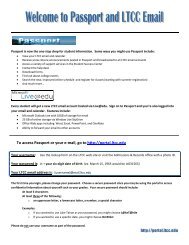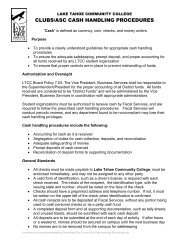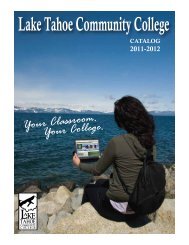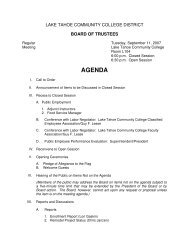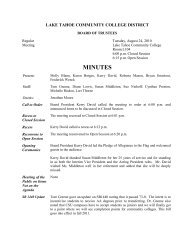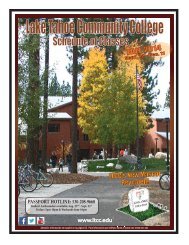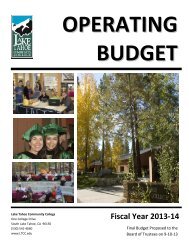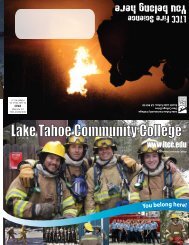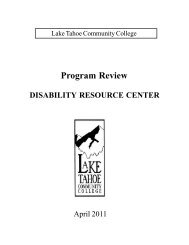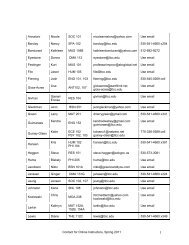View the 2010-2011 Catalog (4 MB) - Lake Tahoe Community College
View the 2010-2011 Catalog (4 MB) - Lake Tahoe Community College
View the 2010-2011 Catalog (4 MB) - Lake Tahoe Community College
- No tags were found...
Create successful ePaper yourself
Turn your PDF publications into a flip-book with our unique Google optimized e-Paper software.
MUSIC180LTCC CATALOG <strong>2010</strong>-<strong>2011</strong>MUS 104C MUSIC OF THE WORLDLecture 4, Lab 0, Units 4Students will explore music from diverse cultures throughout <strong>the</strong>world, including <strong>the</strong> Caribbean, <strong>the</strong> Americas, Africa, Asia, andEurope. This course will examine <strong>the</strong> historical and cultural contextas well as <strong>the</strong> role and function of various types of music.Transfers to CSU, UNR, UCADVISORY: ENG 101 or equivalent.MUS 104D MUSIC OF LATIN AMERICALecture 4, Lab 0, Units 4In this course, students will learn about <strong>the</strong> indigenous dance, folkmusic, and popular music of Latin countries with an examination ofmodern and historical Latin music styles while discovering "Who'sWho" among Latin performers. The course will include relatedrepresentational performing groups and independent artists of Latincountries, as well as discuss instrumentation and cultural uses of Latinmusic in society.Transfers to CSU, UNR, UCADVISORY: ENG 101 or equivalent.MUS 104E THE BEATLESLecture 4, Lab 0, Units 4This is an in-depth examination of <strong>the</strong> lives, music, careers, social andmusical influences of George Harrison, John Lennon, Paul McCartneyand Ringo Starr as The Beatles. The course will begin from <strong>the</strong> group'sorigin through <strong>the</strong> present day. This course will include study of musicstructure, lyrics, instrumentation, and recording techniques of selectedcompositions.Transfers to CSU, UNR, UCADVISORY: ENG 101 or equivalent.MUS 104F HISTORY OF JAZZLecture 4, Lab 0, Units 4This course explores <strong>the</strong> history of jazz from its origins to currentartists and styles. The course will examine <strong>the</strong> development of jazzperformance, instrumentation and stylistic changes from its roots inragtime, and growth through Dixieland Jazz, <strong>the</strong> Big Band era, Bebop,Afro-Cuban Jazz, fusion and smooth jazz. From Louis "Satchmo"Armstrong to "Cannonball" Adderley and Frank Zappa, this coursewill survey <strong>the</strong> composers and performers in jazz styles and genres.Transfers to CSU, UNR, UCADVISORY: ENG 101 or equivalentMUS 111 BASIC MUSIC THEORY ILecture 4, Lab 2, Units 4.75Students will learn basic pitch and rhythmic notation, major scale<strong>the</strong>ory, circle of fifths, and principles of basic chord construction.Theory skills will be applied practically through application to piano,voice, and rhythm instruments. Beginning ear-training skills, includingboth simple time and diatonic intervals, will be stressed. This courseis recommended for all students in performance courses; for studentsin piano, voice, and guitar courses; for Early Childhood Educationmajors; and for Fine Arts majors with an emphasis in music.Transfers to CSU, UNR, UCMUS 112 BASIC MUSIC THEORY IILecture 4, Lab 2, Units 4.75This course is a continuation of MUS 111. Students will studymajor and minor key signatures and scales, interval structures as <strong>the</strong>yrelate to chords and scales, all types of simple and complex triads,seventh chords, and chord inversion. Emphasis will also be placed ondeveloping sight-singing and recognition of diatonic intervals, sightsingingand ear-training, including melodic and rhythmic dictationskills in simple and compound time with subdivided beats, and inmajor and minor scale systems.Transfers to CSU, UNR, UCADVISORY: MUS 111 or equivalent.MUS 113 BASIC MUSIC THEORY IIILecture 4, Lab 2, Units 4.75This course is a continuation of MUS 112. Students will reviewcomplex triads, as well as dominant, major, minor, and diminishedseventh chords, and <strong>the</strong> harmonic function of chords within a majoror minor key. Students will harmonize a melody, learn to write4-part harmonizations with correct voice-leading techniques, andidentify chord structures through numerical analysis. O<strong>the</strong>r topicsinclude <strong>the</strong> use of modes, pentatonic and blues scales, and techniquesof constructing a melody based on repetition, contrast, form, anddesign. Ear-training exercises will cover melodic and rhythmicdictation in simple and complex meters including subdivision of <strong>the</strong>beat. Harmonic dictation exercises will cover recognition of major andminor triads and seventh chords within a key.Transfers to CSU, UC, UNRADVISORY: MUS 112 or equivalent.MUS 118A BEGINNING MIDI APPLICATIONSLecture 1, Lab 3, Units 2This course provides students with practical applications of computerbasedmusic compositional practices using musical instrument digitalinterfaces (MIDI). Emphasis will be placed on <strong>the</strong>oretical knowledgeand hands-on experience in <strong>the</strong> areas of music production, publishing,performing, structure, and orchestration using MIDI sequencing,notation, or looping software.Transfers to CSU, UNRADVISORY: MUS 111, 133A or equivalent.REPEATABILITY: May be repeated 5 times.MUS 123 BEGINNING VOICELecture 1, Lab 3, Units 2This course is a beginning level course in <strong>the</strong> fundamentals ofclassical singing technique including posture, breathing, open throat,forward placement, and diction. Opportunities for performance wi<strong>the</strong>valuation of sound vocal practice are provided. Repertoire will consistprimarily of folk songs, musical <strong>the</strong>ater, and art songs.Transfers to CSU, UNR, UCREPEATABILITY: May be repeated 5 times.MUS 124 INTERMEDIATE VOICELecture 1, Lab 3, Units 2This course focuses on intermediate level course instruction in<strong>the</strong> fundamentals of classical singing technique, including posture,breathing, principles of tone production, and correct diction. Moreintensive performance experience is provided. Musical <strong>the</strong>atre andpopular styles techniques will be introduced as well.Transfers to CSU, UNR, UCADVISORY: MUS 123 or equivalent.REPEATABILITY: May be repeated 5 times.



